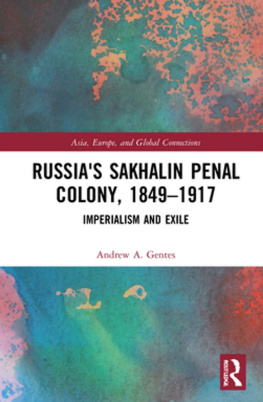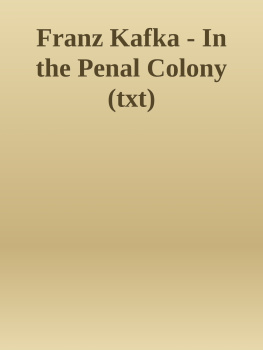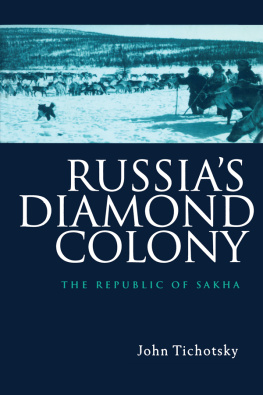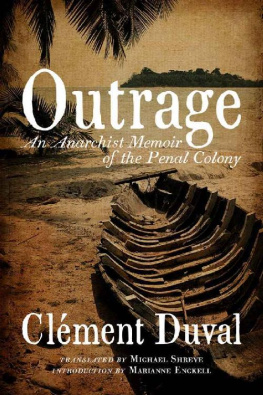Russias Sakhalin Penal Colony, 18491917
This book provides a comprehensive history of the genesis, existence, and demise of Imperial Russias largest penal colony, made famous by Chekhov in a book written following his visit there in 1890. Based on extensive original research in archival documents, published reports, and memoirs, the book is also a social history of the late imperial bureaucracy and the subaltern society of criminals and exiles; an examination of the tsarist states failed efforts at reform; an exploration of Russian imperialism in East Asia and Russias acquisition of Sakhalin Island in the face of competition from Japan; and an anthropological and literary study of the Sakhalin landscape and its associated values and ideologies. The Sakhalin penal colony was one of the largest penal colonies in history. The books conclusion prompts important questions about contemporary prisons and their relationship to state and society.
Andrew A. Gentes earned his doctorate in history from Brown University and works as an independent scholar.
Asia, Europe, and Global Connections
Culture, History, and Trans-Area Studies
Series Editors:
Chunjie Zhang, University of California, Davis, USA
Stefan Keppler-Tasaki, University of Tokyo, Japan
Reto Hofmann, University of Western Australia, Perth, Australia
Given the rising interdisciplinary interest in studying Asia and Europe in a global context, this series aims to publish innovative studies of connections and comparisons between Europe and Asia in all historical periods. It supports advanced research in Asian European relations and fosters our understanding of the entanglements and disconnections between and beyond these two major cultural and geographical areas. Much work on Asia and Europe studies these regions in isolation, without making comparisons and contrasts with other regions of the world and without drawing out the lessons from one region which may be applicable elsewhere. Asia and Europe contain histories of cultural and economic exchange, forms of enlightenment and reasoning, colonialism, imperialism, nation building, fascism, militarism, and democratization, and an understanding that connects these areas of knowledge will yield new insights into globally shared history and envision a more integrated future. The series includes work on literary, cultural, and historical connections and comparisons; it also welcomes scholarship on contemporary issues, ranging from economics to sociology and popular culture. In terms of theory it supports non-Eurocentric and non-ethnocentric approaches. Studies on Asian and European connections in other parts of the world such as the Americas are also welcome.
1. Russias Sakhalin Penal Colony, 18491917
Imperialism and Exile
Andrew A. Gentes
https://www.routledge.com/Asia-Europe-and-Global-Connections/book-series/AEC01
Russias Sakhalin Penal Colony, 18491917
Imperialism and Exile
Andrew A. Gentes
First published 2021
by Routledge
2 Park Square, Milton Park, Abingdon, Oxon OX14 4RN
and by Routledge
52 Vanderbilt Avenue, New York, NY 10017
Routledge is an imprint of the Taylor & Francis Group, an informa business
2021 Andrew A. Gentes
The right of Andrew A. Gentes to be identified as author of this work has been asserted by him in accordance with sections 77 and 78 of the Copyright, Designs and Patents Act 1988.
All rights reserved. No part of this book may be reprinted or reproduced or utilised in any form or by any electronic, mechanical, or other means, now known or hereafter invented, including photocopying and recording, or in any information storage or retrieval system, without permission in writing from the publishers.
Trademark notice: Product or corporate names may be trademarks or registered trademarks, and are used only for identification and explanation without intent to infringe.
British Library Cataloguing-in-Publication Data
A catalogue record for this book is available from the British Library
Library of Congress Cataloging-in-Publication Data
A catalog record has been requested for this book
ISBN: 9780367751449 (hbk)
ISBN: 9780367751463 (pbk)
ISBN: 9781003161202 (ebk)
Typeset in Goudy
by Deanta Global Publishing Services, Chennai, India
Contents
Whenever a community gains in power and pride, its penal code becomes more lenient, while the moment it is weakened or endangered the harsher methods of the past are revived.
Friedrich Nietzsche
[L]andscape represents an historically specific way of experiencing the world developed by, and meaningful to, certain social groups. Landscape is an ideological concept.
Denis E. Cosgrove
When you imaginarily transport yourself to the worlds end where lies the wretched island, there sweeps across the imagination: barracks, wards, maidany, penal laborers, guards, executioners, mares, rods, whips, wheelbarrows, chains, cassocks, prison sandals, shaved heads, labor quotas, rations, skilly, ramson, keta, sables, bears, Giliaks, yurts, sleighs, vagabonds, cordons, exile-settlers, cohabitants, blizzards, taiga, coal shafts. This Sakhalin kaleidoscope is so complex in consistency it will hang before my eyes my entire life.
Ivan P. Iuvachv
Let us descend now into the blind world, / Began the Poet, pallid utterly;/ I will be first, and thou shalt second be.
Dante Alighieri
Notes
- , The Birth of Tragedy and The Genealogy of Morals, trans. Francis Golffing (New York, 1956), 205 [quote is from the Genealogy].
- . Cosgrove, Social Formation and Symbolic Landscape (London, 1984), 15.
- Miroliubov [Ivan P. Iuvachv], Vosem let na Sakhaline (S.-Peterburg, 1901), 28485 [orig. ellipsis].
- Divine Comedy of Dante Alighieri, trans. Henry Wadsworth Longfellow (Boston, 1867) 3: IV: 1315.
For the text of this book, I use a modified version of the LOC Cyrillic transliteration system that dispenses with diacritical marks at the end of words so as to facilitate use of the possessive s. All diacritical marks are retained for the reference notes and bibliography. Many place names on Sakhalin derive from the Japanese, Ainu, or Giliak (modern-day Nivkhi), and as a result, their Russian spellings and corruptions require frequent use of the letter . Because both and the Cyrillic are transliterated using the English letter e, I have chosen to identify and better capture the former letters sound by adding to it an accent aigu, as in Du Post.
Concerning dates, tsarist Russia adhered to the Old Style Julian calendar, which during the nineteenth century was 12 days, and during the twentieth century 13 days, behind the New Style Gregorian calendar. In the pages that follow, events are dated according to the Julian calendar; but if these events had international resonance (e.g., the Treaty of St. Petersburg), I include both the old and new style dates so as to avoid confusion.
All photos in this book fall under either Public Domain or Fair Use rules. Most were acquired via the LOCs online Digital Collections. Photo 1 is unattributed and originally appeared in V. V. Lanin, Post Du na ostrove Sakhalin (N.l., 1871). Photos 2, 3, 7, 9, and 12 are tentatively attributed to Innokentii I. Pavlovskii, manager of the Du Post telegraph station, and are held in a collection titled Vidy i tipy ostrova Sakhalin











